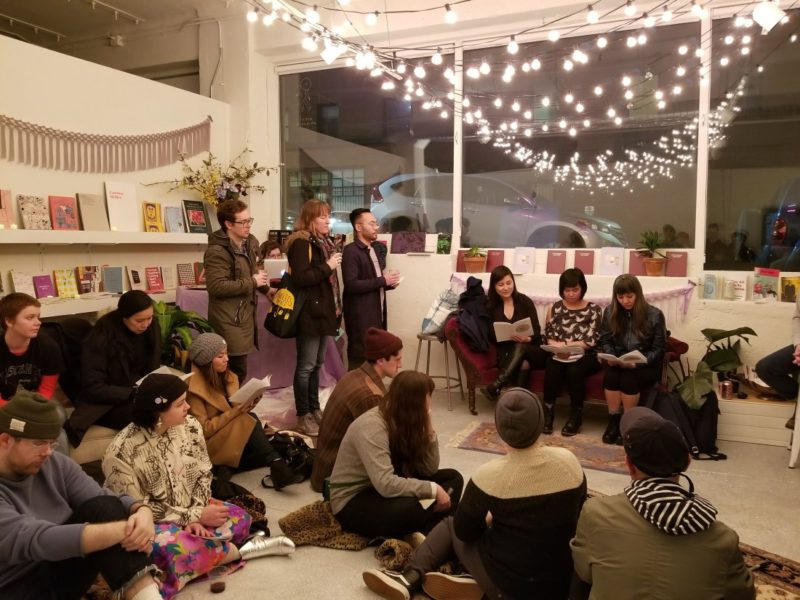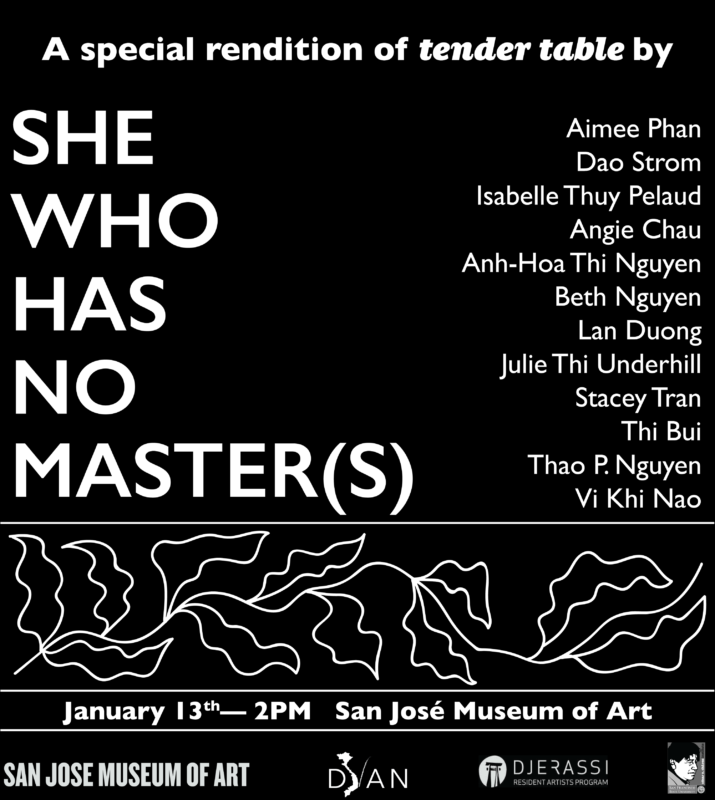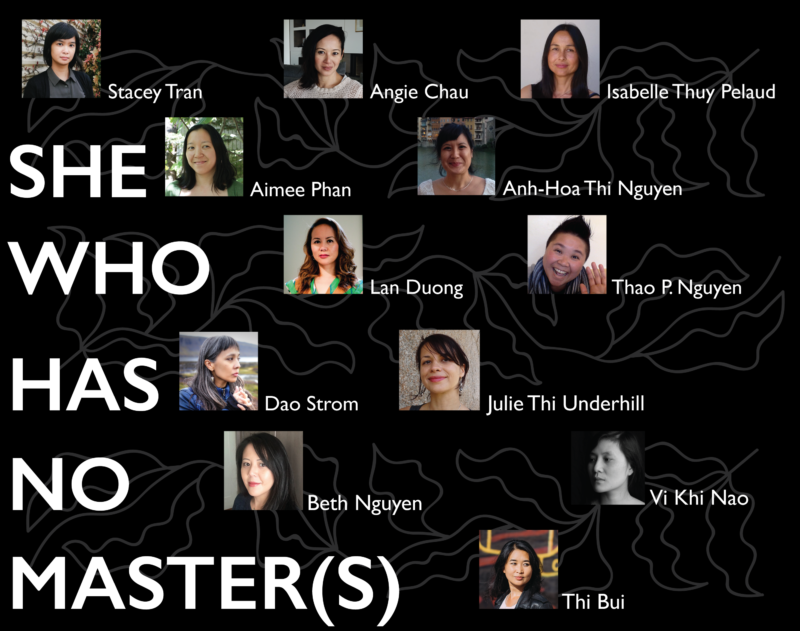Juliet Dang, author of the blog femme intelligente, attended the book release event for Stacey Tran’s debut poetry collection Soap for the Dogs, back in February 2018, which was presented by Gramma Press and Mount Analogue as a She Who Has No Master(s) literary event. To celebrate Stacey’s debut collection, she was joined by Vietnamese diasporic women writers Vi Khi Nao and Dao Strom; all three are members of a collective of Vietnamese women writers of the diaspora, She Who Has No Master(s). At the Mount Analogue event in Seattle, WA, the trio presented work contemplating “hunger” and “memory.” Juliet writes about that event and interviews the three poets in a piece originally published on her blog, femme intelligente, “a blog about non-ordinary women.”
She Who Has No Master(s) continues to write, talk, eat, think, muse, and bond over writing about (and around) hunger, food, identity, memory, community, and more. If you are in the San Jose, CA area on Jan. 13, 2019, you can catch them at this Tender Table event at the San Jose Museum of Art.
~~~
Tender Table is a storytelling platform for women of color (queer, trans, cis), femmes of color, and gender-nonbinary Black, indigenous, people of color (BIPOC) to share narratives about food and its connections to identity, memory, and community. Through food, we connect with our culture, and at times it is through food that we share our culture with others. Join She Who Has No Master(s) for a conversation about our connections to food, family, identity. She Who Has No Master(s) is a project of DVAN (Diasporic Vietnamese Artists Network) and a collective of women and gender-nonconforming writers of the Vietnamese diaspora: Aimee Phan, Dao Strom, Isabelle Thuy Pelaud, Angie Chau, Anh-Hoa Thi Nguyen, Beth Nguyen, Lan Duong, Julie Thi Underhill, Stacey Tran, Thi Bui, Thao P. Nguyen, Vi Khi Nao.
This program is presented in partnership with the Djerassi Resident Artists Program.
Creative Minds is a series of programs of the San Jose Museum of Art that give the public the chance to meet and hear from artists and experience in creativity in action. Space is limited and advance tickets are strongly recommended.
This event is co-sponsored by SF State University and the Cesar Chavez Institute.

A femme intelligente interview with She Who Has No Master(s)
Near the end of last February, I saw an event floating in my FB newsfeed entitled Soap for the dogs x She who has no master(s). It caught my eye because I noticed the names of three Viet women: Vi Khi Nao, Dao Strom, and Stacey Tran. I must go, I must support, were the words running through my head. So I did, and I even brought some of my friends.
The event was intimate, warm, a stirring of lovely energies bouncing from the strings of dangling lights. I noticed the community that came to support was not super diverse. What I truly wanted to see were more people from the Viet community. I mean, there was like a handful of us, minus the writers of course, but that is entirely not enough. From my own personal experience, the ones who show up at my events are usually from the non-Viet community unfortunately. I have hella Black and white people at my events, which is bloody bomb and fantastic, but it would be nice to see more Viets in the crowd.
Anyhow, back to the event. I felt nothing but magic for these female writers I watched intently. I listened carefully to their personal excerpts telling stories of hunger and being. I was entranced, inspired, and wanted everyone to know that there are local Viet women within our community expressing themselves, their art. Which is why I decided to do an interview with Vi, Dao, and Stacey.
Cheeky, witty, candid, humourous, raw, bold, fish saucy is how I would sum up this interview. My support and adoration for these women is immense.
:: INTERVIEW ::
How long have you been professionally writing for?
Vi: Since 2005, about 13 years.
Stacey: I’m not sure I would consider myself a professional. I’ve been writing since I was 11.
Dao: For a long time I was always more comfortable just saying “I write” than calling myself a writer. I’ve written ever since I was a child, and I published my first short story when I was 22, my first novel the year I turned 30. So, 20+ years of endeavoring to write and feeling “professional” about it some years more than others.
Was your family supportive of your career decision?
Vi: No, my mom wants me to be a plastic surgeon and my dad wants me to be not green, facewise, and healthy.
Stacey: My parents wanted me to devote my life to something I’m passionate about. I feel very fortunate for that, because I didn’t experience pressures from them to study a certain subject and pursue a certain career track. I meant to pursue journalism in college, but that changed quickly to poetry when I realized community is so important, and I recognized myself in a community among poets.
Dao: My mother was a journalist in her early years, so to some degree yes my family was supportive. But they also still would’ve liked to see my life be more stable, practical, etc. Writing is not a stable or lucrative vocation. I think my tolerance for uncertainty and risk-taking – career-wise (i.e. all those years of quiet working and little outwardly visible success or achievements) – could at times be a source of worry for my parents.
What obstacles have you faced specifically as a female, Vietnamese writer?
Vi: It’s really hard to date Vietnamese men. I haven’t been able to date one successfully and write about it! I think this failure is born from my exposure to watching too much tennis. Like the French Open. The French Open has been a huge obstacle for me. But like any obstacle, it has helped me more than hurt me. I want Dao and Stacey to win something big. The sooner the better. Preferably in 2020. Like the National Book Award in Experimental Poetry (oh, they don’t have one? Well, they better!). I think Dao and Stacey are amazing poets and the only thing preventing them from fainting is disruptive tea ceremonies.
What lessons have you learned that you would like to share to other Vietnamese writers new in their careers?
Vi: Don’t become a writer. And, if you must write, eat fish sauce in front of and behind white people.
Stacey: I like Vi’s advice. I have somehow followed this advice intuitively accidentally. My advice is to always take Vi’s advice.
Dao: I think this is another way of saying: be strong culturally and personally, if you want to be a writer, and have moxie about not conforming the white and racist structures you’ll surely somehow or another encounter.
What are the main themes within your pieces?
Vi: Sex, death, orgies, immigration, fish sauce.
Stacey: Food, family history, romantic love, childhood memories, ancient futures.
Dao: Displacement, ethos, longing, perception, esoteric and feminine perceptions.
How did you all connect and how did your event come to be?
Stacey: Dao and I both live in Portland, OR, and we connected after I saw her read at Literary Arts a couple years ago. I told her it was the first time I’d seen a Vietnamese woman writer read. It broke something open for me, a clarity, a wellspring of confidence for me to continue writing as a Vietnamese woman writer.
I’m not sure how Vi found me, but I received a friend request from her on Facebook one day. Weeks went by, I let the friend request sit there, and then Dao gave me a copy of Vi Khi Nao’s book, Fish in Exile, which I imagine as a film quite vividly in my mind.
Vi and I have had a long distance relationship. She was the primary editor of my book, Soap for the Dogs, and I’m so indebted to her for her care and curiosity about my work.
Both Dao and Vi have been amazing mentors/friends/spirits around me, that it was without a doubt I would ask them to read with me for the release of my book. We decided to write a collaborative piece together on the themes of hunger and memory, which we read from at the Seattle launch party for Soap for the Dogs.
Dao: Both Stacey and Vi are inspirations to me, and I’m so glad to have found them–or them to have found me. Back in 2015 I became part of a collective of Vietnamese women writers, with a few other women writers mainly based in the Bay Area, and after meeting Stacey I asked her to join our collective when we did an event in Portland in 2016. A part of joining this collective involves participating in collaborative writing projects together, so now Vi is part of this group too. The collective is called She Who Has No Master(s) and we formed it as a space for creative collaboration and putting our voices together, sometimes to voice experiences that may be difficult, as a woman, to stand up and talk about alone. The multi-voice poem/writing format is also a way of reimagining the structure of a piece of writing or art, that it can consist of multiple – many individual – voices and perspectives, while also representing a collective. There is an interesting process in coming together as Vietnamese writers, where our common ground, essentially, whether it is our own or our families’ experience, is the seed of having at some point left Vietnam–so, we each have this story of separation in our memories or in our cells, it is something we all know or have inherited. In coming together now and sharing, making art together, I like to think we engage in some form of healing. It is also just powerful to witness how much strength and intelligence and depth there is in any gathering of Vietnamese women.
Vi: I don’t quite remember how I met Stacey, but with Dao – I think she wrote me to solicit a piece for diaCRITICS or Eric Nguyen was going to write a review for The Old Philosopheror something like that and I responded like how I usually respond to things: by not spilling a bowl of hot water while carrying it to a nearby table to make instant, fresh gỏi cuốn with my family. Her email connected me immediately to the broader network of Vietnamese writers in the United States and around the world. She is like a Vietnamese ambassador for Vietnamese writers. I think I met Stacey in the same way that I met Katrina Dodson, the Clarice Lispector translator. One day, feeling utterly disconnected from my Asian heritage (I was living in South Bend at that time), I noticed randomly on Katrina’s FB an image of her sitting in front of a large plate of bánh xèo and I said to myself, I must become friends with this girl. Now I think I choose my friendships based on that person’s ability to eat Viet foods. If I foresee their potentiality to dismiss this exquisite aspect of my existence, I drop that friendship like hot lava. There have been exceptions, of course, but let’s not get ahead of ourselves. Barbara Walters might be watching 20/20.
Anything else we should know about you?
Vi: I am in Mexico City right now and because I ate pasta at my friend’s favorite restaurant, my face has become a blowfish. I can’t wait to dip my blowfish face in fish sauce.
Dao: In the spirit of fish themes… another Vietnamese woman poet when I first met her (another poet in our She Who Has No Master/s collective) told me that she thought I reminded her of a jellyfish. We looked up some facts about jellyfish and one said that they communicate by making their bodies flash colored lights. Maybe poetry is a form of flashing colored lights at each other or, at least, into our shared spaces, whatever that may be trying to say.
Stacey: I just finished translating a poem by Huy Cận.
.
.
.
Tender Table with She Who Has No Master(s) will be presenting a storytelling event with 12 writers at San Jose Museum of Art on 1/13/19. Tickets available here.


CONTRIBUTOR BIOS
Juliet Dang PhD, MS, RDH
Scientist, artist, actress, model, creative director, producer, international speaker, filmmaker, Canadian prairie girl residing in Seattle. Juliet’s laser focus is to highlight and exhibit the talents of POC, especially women of colour.
Stacey Tran is a writer from Portland, OR currently based in Providence, RI. She is the creator of Tender Table, a storytelling series about food, family, identity. Her writing can be found in BOMB Magazine, The Brooklyn Rail, and diaCRITICS. She is the author of Soap for the Dogs (Gramma, 2018).
Vi Khi Nao is the author of Sheep Machine (Black Sun Lit, 2018) and Umbilical Hospital (Press 1913, 2017), and of the short stories collection, A Brief Alphabet of Torture, which won FC2’s Ronald Sukenick Innovative Fiction Prize in 2016, the novel, Fish in Exile (Coffee House Press, 2016), and the poetry collection, The Old Philosopher, which won the Nightboat Books Prize for Poetry in 2014. Her work includes poetry, fiction, film and cross-genre collaboration. Her stories, poems, and drawings have appeared in NOON, Ploughshares, Black Warrior Review and BOMB, among others. She holds an MFA in fiction from Brown University, where she received the John Hawkes and Feldman Prizes in fiction and the Kim Ann Arstark Memorial Award in poetry.
Dao Strom is the author of a bilingual poetry/art book, You Will Always Be Someone From Somewhere Else (Ajar Press, 2018), an experimental memoir, We Were Meant To Be a Gentle People + music album East/West (2015), and two books of fiction, The Gentle Order of Girls and Boys (2006) and Grass Roof, Tin Roof (2003). Her work has received support from the Creative Capital Foundation, National Endowment for the Arts, Precipice Fund, Regional Arts & Culture Council, Oregon Arts Commission, and others. She is the editor of diaCRITICS and co-founder of the arts collective She Who Has No Master(s).


